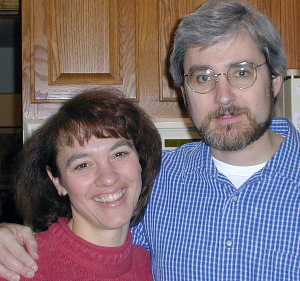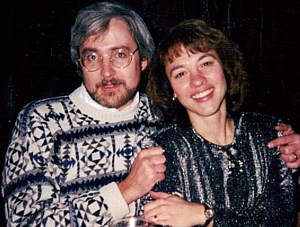A Caregiver Deals with Sarcoma Recurrence
 Dictionary.com defines recurrence as "to happen, come up, or show up again or repeatedly." The words "nightmare, horrific or devastating" don’t appear in that definition, but for families of cancer patients they should. A diagnosis of recurrence is our worst fear. The time spent in between scans waiting to see if cancer has recurred can poison our lives and destroy any chance of hope and happiness.
Dictionary.com defines recurrence as "to happen, come up, or show up again or repeatedly." The words "nightmare, horrific or devastating" don’t appear in that definition, but for families of cancer patients they should. A diagnosis of recurrence is our worst fear. The time spent in between scans waiting to see if cancer has recurred can poison our lives and destroy any chance of hope and happiness.
My husband John has battled a chondrosarcoma of the thoracic spine for over eleven years. We have been through nine surgeries in four major hospitals on the east coast, experimental radiation and experimental chemotherapy. John became a paraplegic 18 months ago, most likely due to damage brought on by chemotherapy. As John has suffered with his medical condition, I have suffered along with him. We have been married 27 years, and it’s not possible to separate his suffering from mine. This has become our disease. He struggles for the strength to get through each day. I make sure he gets the care he needs in order to make those days possible.
John was diagnosed in 1982 with an enchondroma, a benign bone growth on his vertebrae. It was successfully removed and we went on with our lives, never giving the surgery more than an occasional passing thought. Sixteen years later this benign growth mutated into a low-grade malignant growth called a chondrosarcoma. At that time the biopsy was inconclusive, but as the tumor kept recurring (18 months later, than again in 12 months, than in 6, and finally only 3 months after surgery) it was determined that the tumor was definitely malignant and we were in real trouble. The doctors told us additional surgeries were useless and they recommended conventional radiation which might destroy the tumor but would certainly kill his spinal cord in the process. After doing our own research we found an experimental proton radiation in Boston which halted the tumor for over three years. Just when we thought we could stop holding our breaths, a routine checkup again showed a tumor recurrence. This unexpected news left us stunned and reeling. Three more tumor removals followed and when the tumor came back again the doctors gently explained that John’s spine was too unstable to risk another invasive surgery. Experimental chemotherapy followed as a desperate attempt at stopping the tumor’s progression. Four months of treatments left the tumor measurably smaller and seems to have halted the progression, but has left John’s spinal cord so severely damaged that he is completely without feeling or ability to move from mid-chest down. He currently is dependent on me and two hired caregivers for even the most basic human needs.
 As John’s primary caregiver, I had a different role than he did when dealing with tumor recurrences. We had two young daughters during those years when he was in and out of the hospital. It was my job to talk to them about what was happening. I made it a point never to lie to them ("don’t worry, Daddy will be just fine"), but to tell them only what they needed to know at the moment so they would understand what was happening ("Daddy will be going to the hospital for an operation and he will come home in a week"). In spite of my best efforts, both girls ended up overhearing bits of conversations that confused and frightened them. Despite my best efforts at normalcy they could sense how frightened I was. They were anxious and upset but couldn’t figure out what they were afraid of. I finally decided that they should be allowed to express their feelings too, no matter how painful or upsetting they were. We cried together when John went in the hospital, and they understood that all of us were scared. They asked me outright, "Is Dad going to die?" and I was able to answer truthfully that I didn’t think so. We have had these conversations in various forms from pre-school through high school and it never gets easier, but it has brought us closer together. I wish I could have protected my girls from this kind of pain, but looking back I made the right decision for our family by allowing my girls to share their fears and anxieties.
As John’s primary caregiver, I had a different role than he did when dealing with tumor recurrences. We had two young daughters during those years when he was in and out of the hospital. It was my job to talk to them about what was happening. I made it a point never to lie to them ("don’t worry, Daddy will be just fine"), but to tell them only what they needed to know at the moment so they would understand what was happening ("Daddy will be going to the hospital for an operation and he will come home in a week"). In spite of my best efforts, both girls ended up overhearing bits of conversations that confused and frightened them. Despite my best efforts at normalcy they could sense how frightened I was. They were anxious and upset but couldn’t figure out what they were afraid of. I finally decided that they should be allowed to express their feelings too, no matter how painful or upsetting they were. We cried together when John went in the hospital, and they understood that all of us were scared. They asked me outright, "Is Dad going to die?" and I was able to answer truthfully that I didn’t think so. We have had these conversations in various forms from pre-school through high school and it never gets easier, but it has brought us closer together. I wish I could have protected my girls from this kind of pain, but looking back I made the right decision for our family by allowing my girls to share their fears and anxieties.
Caregivers need to be the ones making the practical decisions while their loved one is undergoing medical treatments. When John underwent surgery he needed all his mental and physical reserves focused on his healing and recovery. Routine chores like grocery shopping and paying bills were the last thing on his mind. Unfortunately these things still needed to be attended to, and I added them to my growing list of responsibilities. I juggled my full-time job and the needs of our children with hospital visits and post-operative care at home. The stress of worry combined with the need to be working round-the-clock in order to maintain a stable home environment is impossible to describe to someone who hasn’t experienced it themselves. Caregivers suffer the most when a loved one is seriously ill. We are determined to provide the best care for our loved one, and it is always at the expense of our own physical and mental well-being. I have learned over many years to accept help when it is sincerely and genuinely offered. It doesn’t benefit my family to see me just barely holding myself together. A home-cooked dinner, transportation for the girls to and from Saturday activities, grocery shopping or offers to run errands have all helped me keep my sanity during the worst of John’s medical issues.
People handle the time between recurrences differently. John always dismissed the possibility of another recurrence and refused to think about it. I needed to make plans for every possible scenario good or bad, just in case. While I respected John’s need to push the idea of another surgery out of his mind, it left me alone to deal with the future and keep things normal for our family. At times I felt that it was unfair to hand this burden to me entirely, but I understood that John needed to be able to forget about the possibility of recurrence in order to focus on healing and coping with his emotional well-being. I counted the months and weeks in between scans and scheduled our lives around them. In between bouts of bad news I kept our lives running smoothly and with relative normalcy, but always felt like an enormous hammer was poised over all of us, just waiting to come down and smash us flat. I would literally be sick with worry the week before he was scheduled for scans, and good test results only meant a reprieve before the cycle started over again.
 John and I have had some of our closest moments together in between recurrences. Everyday annoyances and problems seem like nothing when faced with the very real possibility of death. We have sat on the patio together in the summer in between surgeries and reminisced about why we fell in love. We’ve talked about the people in our lives that mean the most to us and how blessed we have been in so many ways. We talk about our daughters, how different they are from each other and how proud we are of both of them. We’ve talked about the after-life and how we believe that we will be together in heaven someday. Right now we don’t worry about recurrences. John has decided not to pursue any further treatments if the tumor show activity at his next scan and I agree with his decision.
John and I have had some of our closest moments together in between recurrences. Everyday annoyances and problems seem like nothing when faced with the very real possibility of death. We have sat on the patio together in the summer in between surgeries and reminisced about why we fell in love. We’ve talked about the people in our lives that mean the most to us and how blessed we have been in so many ways. We talk about our daughters, how different they are from each other and how proud we are of both of them. We’ve talked about the after-life and how we believe that we will be together in heaven someday. Right now we don’t worry about recurrences. John has decided not to pursue any further treatments if the tumor show activity at his next scan and I agree with his decision.
There are two things I associate with all our years of dealing with tumor recurrence – fear and exhaustion. I can’t say I handled either of these well, but I did develop some strategies that worked for me. Whenever John was facing another procedure, I would ask myself, "What is the worst possible thing that can result from this recurrence?" The answers were different each time, but analyzing the situation and putting it in concrete terms took some of the anxiety away. Sometimes the worst case scenario was merely an inconvenience to our schedules, other times it was the very real chance that John would never walk again. The post-operative possibilities were overwhelming but at least I knew I wouldn’t be blind-sided by an unexpected outcome. Fatigue and exhaustion caused by worry and overwork were inevitable and I made a conscious decision to try and relieve some of the overwhelming stress. After many years of sitting by John’s hospital bed, I started leaving earlier at night to ensure that I got at least six hours of sleep. John was disappointed when I asked to leave before 9:00 p.m. but I realized the lack of sleep was taking its toll on me, both physically and mentally. It was a small compromise for John and it made a huge difference in my ability to get through the next day. I also began asking family members for help, but was surprised by their reaction. John’s family and my relatives were not used to my asking for help. Over the years I had set a precedent for being able to handle his hospital stays by myself. There was reluctance even from close family members to give up comfortable routines and social lives to help our family through each crisis. I made it clear that in the future I would only ask for assistance when I was absolutely at the end of my physical reserves, but I did (and still do) feel resentment at the lack of empathy and caring from people who claim they love and care about us.
If I had words of advice for other caregivers to get them through short-term crisis, I would suggest home health care assistance, counseling, support groups and making sure your doctor understands the stress that you are under. We have used home-health care providers sporadically for John over the years when he was recovering from surgery and the peace of mind they provide is priceless. A good caregiver will provide assistance and companionship and allow you to work outside the home or simply take a break now and then. I love my husband with all my heart, but I need to get away from the daily strain of seeing him sick. There are caregiver agencies everywhere, but screen your applicants carefully. We went through dozens of caregivers before finding only two that I would trust to leave John alone with. Both of our caregivers have different personalities, but they are loving, hard-working and respectful to John’s needs. Don’t settle for someone you are not absolutely comfortable with simply because they are certified in their field.
Counseling can be a real help in dealing with your conflicting emotions about your situation. In eleven years I have only gone twice for counseling, but each time I came away with eye-opening insights that helped me better cope with my feelings of despair. The counselor recommended a session with John but he has refused to discuss his condition with anyone outside the family, and then only on rare occasions. His method of coping with his illness is avoidance, and while I don’t agree with this I accept that this is his comfort zone. I have also discussed our home situation with our family physician. Our doctor has recommended I begin antidepressants and maybe I will consider this as an option one day, but for now I choose to cope with our home situation without the aid of medication. Talking to other people about our situation helps me battle the feeling of hopelessness and guilt that comes from being home and dealing with a serious illness in the family. There are a number of hospitals in our area that offer caregiver support groups, and double that number of internet sites for caregivers. Reaching out to other caregivers in similar situations removes some of the isolation that we feel when we choose to devote our lives to the care of someone we love.
Being a caregiver is not a thankless job, although as the weeks and months wear on it certainly feels that way. No one applauds us when we fill a prescription, give a glass of water, adjust a pillow, bandage a wound or schedule a doctor’s appointment. Our reward comes from knowing that someone we love feels better, safer and healthier because of what we do. I have to believe that’s a good enough reason to get up tomorrow and do it again.
V6N1 ESUN Copyright © 2009 Liddy Shriver Sarcoma Initiative.
